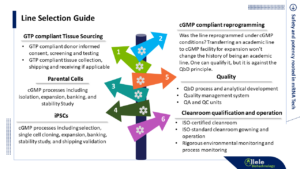New iPSC Lines Created for Clinical Development
SAN DIEGO–2018
SAN DIEGO–2018
iPSCs have been created using mRNA technologies, with cGMP control from donor screening, consenting, to skin punch, and throughout cell bank production.
SAN DIEGO, CA, USA, December 4, 2018 — After 3 years of cleanroom construction and 2 years of quality system establishment, Allele Biotech has produced its initial batch of 6 iPSC (induced pluripotent stem cells) lines that are ready for prime time.

Prior to Allele’s cGMP iPSC generation there were only ~3 GMP iPSC lines available for therapy development from other sources around the world, forcing several pluripotency inspired companies to resort to embryonic stem cells (ESCs) as their starting material. ESC lines have a number of limitations due to questions of whether they were created with consent that meets today’s standards, and whether there have been gaps in custody throughout their history of existence. As the stem cell-based therapy field ramps up towards its exponential phase, there are obvious reasons to produce additional functional cGMP iPS cell lines with diverse genetic backgrounds and differentiation potentials.
Allele’s iPSCs were created using its patented mRNA technologies, with full cGMP monitoring and documentation starting from donor consent, screening and tissue biopsy. In its San Diego facility that received California tissue bank license earlier this year, Allele’s highly trained and dedicated stem cell manufacturing team first produced dozens of banked fibroblast stocks that are fully cGMP-compliant. Now they are churning out iPSC lines at unprecedented pace. Even though it takes just 1-2 weeks to reprogram fibroblasts into iPSCs using the mRNA method, production of cGMP-compliant iPSCs takes 3-4 months due to the stringent testing and quality control assays Allele painstakingly developed and qualified.
In addition to iPSC generation and differentiation, Allele’s proprietary mRNA platform can be used to engineer human iPSCs in a one-time genetic modification event to generate a clonal iPSC line that can be developed into a master cell bank.
Allele has received notification that patents have been allowed in EU and Japan one month after receiving 2 US patents on generating mRNA-iPSCs. mRNA produced iPSCs are more stable and easier to differentiate as Allele has previously reported, and their manufacturing process is continually being improved and upgraded. Focusing on industrial use of iPSCs, Allele has established a suspension iPSC culture system that can generate billions of iPS cells in a closed system before induction to differentiation.